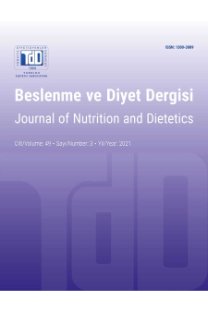Glikojen Depolarının ve Sıvı Besin Alımının Egzersiz Sırasında Yağ ve Karbonhidrat Kullanımına Etkisi
Effect of Glycogen Stores and Liquid Food Intake on Fat and Carbohydrate Utilization During Exercise
___
- Achten J, Jeukendrup AE. Optimizing fat oxidation through exercise and diet. Nutrition (Burbank, Los Angeles County, Calif) 2004;20(7-8):716-727.
- Jeukendrup AE. Modulation of carbohydrate and fat utilization by diet, exercise and environment. Biochem Soc Trans 2003;31(Pt 6):1270-1273.
- Nieman DC, Carlson KA, Brandstater ME, Naegele RT, Blankenship JW. Running endurance in 27-h-fasted humans. J Appl Physiol (1985) 1987;63(6):2502-2509.
- Zinker BA, Britz K, Brooks GA. Effects of a 36-hour fast on human endurance and substrate utilization. J Appl Physiol (1985) 1990;69(5):1849-1855.
- Loy SF, Conlee RK, Winder WW, Nelson AG, Arnall DA, Fisher AG. Effects of 24-hour fast on cycling endurance time at two different intensities. J Appl Physiol (1985) 1986;61(2):654-659.
- Ferguson LM, Rossi KA, Ward E, Jadwin E, Miller TA, Miller WC. Effects of caloric restriction and overnight fasting on cycling endurance performance. J Strength Cond Res/National Strength & Conditioning Association 2009;23(2):560-570.
- Gueye L, Seck D, Samb A, Cisse F, Camara K, Martineaud J. Physiological adaptations to exercise during a short- term fasting. Scr Med (Brno) 2003;76:291-296.
- Dohm GL, Tapscott EB, Barakat HA, Kasperek GJ. Influence of fasting on glycogen depletion in rats during exercise. J Appl Physiol Respir Environ Exerc Physiol 1983;55(3):830-833.
- Knapik JJ, Meredith CN, Jones BH, Suek L, Young VR, Evans WJ. Influence of fasting on carbohydrate and fat metabolism during rest and exercise in men. J Appl Physiol (1985) 1988;64(5):1923-1929.
- Coyle EF, Coggan AR, Hemmert MK, Lowe RC, Walters TJ. Substrate usage during prolonged exercise following a preexercise meal. J Appl Physiol (1985) 1985;59(2):429- 433.
- Civitarese AE, Hesselink MK, Russell AP, Ravussin E, Schrauwen P. Glucose ingestion during exercise blunts exercise-induced gene expression of skeletal muscle fat oxidative genes. Am J Physiol Endocrinol Metab 2005;289(6):E1023-1029.
- Van Proeyen K, Szlufcik K, Nielens H, Ramaekers M, Hespel P. Beneficial metabolic adaptations due to endurance exercise training in the fasted state. J Appl Physiol (1985) 2011;110(1):236-245.
- Oliver SJ, Laing SJ, Wilson S, Bilzon JL, Walsh N. Endurance running performance after 48 h of restricted fluid and/or energy intake. Med Sci Sports Exerc 2007;39(2):316-322.
- Couturier K BP, Latour MG, Lavoie JM. Evidence that a decrease in liver glycogen content stimulates FFA mobilization during exercise. Can J Appl Physiol 2000;25(3):141-152.
- Heyward HV, Stolarczyk, L.M. Applied Body Composition Assesment. USA: Human Kinetics;1996.
- Hawley JA, Noakes TD. Peak power output predicts maximal oxygen uptake and performance time in trained cyclists. Eur J Appl Physiol Occup Physiol 1992;65(1):79-83.
- Currell K, Jentjens RL, Jeukendrup AE. Reliability of a cycling time trial in a glycogen-depleted state. Eur J Appl Physiol 2006;98(6):583-589.
- Kuipers H, Verstappen FT, Keizer HA, Geurten P, van Kranenburg G. Variability of aerobic performance in the laboratory and its physiologic correlates. Int J Sports Med 1985;6(4):197-201.
- Frayn KN. Calculation of substrate oxidation rates in vivo from gaseous exchange. J Appl Physiol Respir Environ Exerc Physiol 1983;55(2):628-634.
- Yeo WK, McGee SL, Carey AL, Paton CD, Garnham AP, Hargreaves M, et al. Acute signalling responses to intense endurance training commenced with low or normal muscle glycogen. Exp Physiol 2010;95(2):351- 358.
- Yeo WK, Paton CD, Garnham AP, Burke LM, Carey AL, Hawley JA. Skeletal muscle adaptation and performance responses to once a day versus twice every second day endurance training regimens. J Appl Physiol 2008;105(5):1462-1470.
- Hulston CJ, Venables MC, Mann CH, Martin C, Philp A, Baar K, et al. Training with low muscle glycogen enhances fat metabolism in well-trained cyclists. Med Sci Sports Exerc 2010;42(11):2046-2055.
- Graham TE, Adamo KB. Dietary carbohydrate and its effects on metabolism and substrate stores in sedentary and active individuals. Can J Appl Physiol 1999;24(5):393- 415.
- Hultman E, Bergström J, Roch-Norlund AE. Glycogen Storage in Human Skeletal Muscle. In: Pernow B, Saltin B, editors. Muscle Metabolism During Exercise. Advances in Experimental Medicine and Biology. 11: Springer US; 1971. p. 273-88.
- Hultman E, Bergstrom J. Muscle glycogen synthesis in relation to diet studied in normal subjects. Acta medicaScandinavica 1967;182(1):109-117.
- Ramos-Jiménez A, Hernández-Torres RP, Torres-Durán PV, Romero-Gonzalez J, Mascher D, Posadas-Romero C, et al. The respiratory exchange ratio is associated with fitness indicators both in trained and untrained men: A possible application for people with reduced exercise tolerance. Clin Med Insights Circ Respir Pulm Med 2008;2:1-9.
- Deuster PA, Heled Y. Chapter 41 - Testing for Maximal Aerobic Power A2 - Seidenberg, Peter H. In: Beutler AI, editor. The Sports Medicine Resource Manual. Philadelphia: W.B. Saunders;2008. p. 520-8.
- Blomstrand E, Saltin B. Effect of muscle glycogen on glucose, lactate and amino acid metabolism during exercise and recovery in human subjects. J Physiol 1999;514( Pt 1):293-302.
- Schisler JA, Ianuzzo CD. Running to maintain cardiovascular fitness is not limited by short-term fasting or enhanced by carbohydrate supplementation. J Phys Act Health 2007;4(1):101-112.
- ISSN: 1300-3089
- Yayın Aralığı: Yılda 3 Sayı
- Başlangıç: 1972
- Yayıncı: Türkiye Diyestisyenler Derneği
TUĞBA KÜÇÜKKASAP CÖMERT, Türkan Kutluay MERDOL
Yenidoğan Döneminde Konstipasyonunun Nadir Bir Nedeni Laktoz İntoleransı Olabilir
Nevra KOÇ, Aynur Küçükçongar YAVAŞ
Özel ve Devlet Huzurevleri Menülerinin Kalite ve Yeterlilik Açısından Değerlendirmesi
Yağmur DEMİREL, SANİYE BİLİCİ, EDA KÖKSAL
Klinik Uygulamalarda Düşük Glisemik ve/veya Besin İnsülin İndeksli Beslenme Yaklaşımları
ZEYNEP CAFEROĞLU, HÜLYA GÖKMEN ÖZEL
SÜLEYMAN BULUT, HÜSEYİN HÜSREV TURNAGÖL
Tam Buğday Ekmeğine Uygulanan Isıl İşlemin Ekmeğin Glisemik İndeksi Üzerine Etkisi
Fitoöstrojenler ve Üreme Sağlığı
BETÜL KOCAADAM BOZKURT, YASEMİN AKDEVELİOĞLU
Tip 2 Diyabetli Bireylerde Abdominal Obezite/Adipozite ve Aterojenik Belirteçlerin Değerlendirilmesi
ÖZGE KÜÇÜKERDÖNMEZ, MERVE ŞEYDA KARAÇİL ERMUMCU, Selda SEÇKİNER, EDA KÖKSAL
